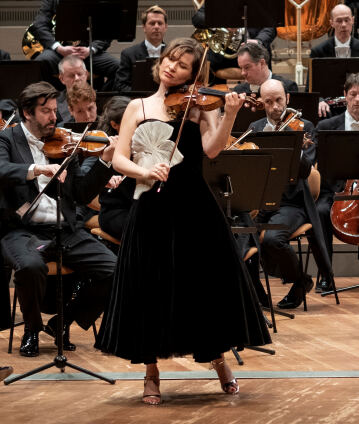Semyon Bychkov and Lisa Batiashvili perform Tchaikovsky’s Violin Concerto

With its beguiling, heartfelt melodies, its captivating dance-like rhythms and its highly virtuosic solo part, Tchaikovsky’s opus 35 is considered the epitome of the Romantic violin concerto. Ideal for a violinist like Lisa Batiashvili, who – according to The Guardian – knows how to interpret this piece in an intense, radiant and heartfelt way. Semyon Bychkov, a long-standing associate of the Berliner Philharmoniker, also conducts Antonín Dvořák’s Seventh Symphony.
A “stunning soloist” (The Guardian): With brilliant, technically flawless and emotionally moving playing, violinist Lisa Batiashvili occupies a permanent place among the greats of her field – on her warm and voluminous 1739 Guarneri, the last instrument made by the famous Italian violin maker Guarneri del Gesù. The Georgian-born musician, who was named instrumentalist of the year by Musical America in 2015, works regularly with the Berliner Philharmoniker. This also applies to Semyon Bychkov, who has been regularly engaged by the orchestra since his highly acclaimed Philharmoniker debut in 1985, when he stood in at short notice for Riccardo Muti, who had fallen ill.
Here Lisa Batiashvili first presents Tchaikovsky’s Violin Concerto, whose planned premiere in March 1879 had to be cancelled because Leopold Auer – founder of the Russian violin school and teacher of Jascha Heifetz and others – declared the work unplayable: even a cursory glance at the score reveals the countless double stops, chains of trills and rapid runs.
The main symphonic work of the evening is Antonín Dvořák’s Seventh Symphony, which in its late-Romantic sound is entirely indebted to Slavic folklore. Even the then dreaded critic George Bernard Shaw praised “the variety of rhythms and figures” after the London premiere.
© 2021 Berlin Phil Media GmbH
Related interviews
Artists
Our recommendations
- Benefit concert “Together for humanity”
- Yannick Nézet-Séguin conducts a “Czech Evening” at the Waldbühne
- Alan Gilbert and Lisa Batiashvili
- 2007 Europakonzert from Berlin with Simon Rattle, Lisa Batiashvili and Truls Mørk
- 2024 Europakonzert with Daniel Harding and Lisa Batiashvili from Tsinandali (Georgia)
- Paavo Järvi and Lisa Batiashvili with Sibelius’s Violin Concerto